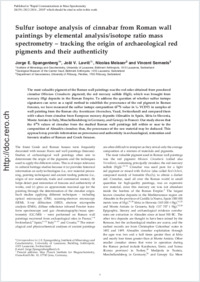Sulfur isotope analysis of cinnabar from Roman wall paintings by elemental analysis/isotope ratio mass spectrometry – tracking the origin of archaeological red pigments and their authenticity
BHAP-HA+SCANT
- Spangenberg, Jorge E. Institute of Mineralogy and Geochemistry, University of Lausanne, Switzerland
- Lavrič, Jošt V. Institute of Mineralogy and Geochemistry, University of Lausanne, Switzerland
- Meisser, Nicolas Geological Museum of the Canton Vaud, Lausanne, Switzerland
- Serneels, Vincent Department of Geosciences, University of Fribourg, Switzerland
-
10.09.2010
Published in:
- Rapid Communications in Mass Spectrometry. - 2010, vol. 24, no. 19, p. 2812-2816
English
The most valuable pigment of the Roman wall paintings was the red color obtained from powdered cinnabar (Minium Cinnabaris pigment), the red mercury sulfide (HgS), which was brought from mercury (Hg) deposits in the Roman Empire. To address the question of whether sulfur isotope signatures can serve as a rapid method to establish the provenance of the red pigment in Roman frescoes, we have measured the sulfur isotope composition (δ³⁴S value in ‰ VCDT) in samples of wall painting from the Roman city Aventicum (Avenches, Vaud, Switzerland) and compared them with values from cinnabar from European mercury deposits (Almadén in Spain, Idria in Slovenia, Monte Amiata in Italy, Moschellandsberg in Germany, and Genepy in France). Our study shows that the δ³⁴S values of cinnabar from the studied Roman wall paintings fall within or near to the composition of Almadén cinnabar; thus, the provenance of the raw material may be deduced. This approach may provide information on provenance and authenticity in archaeological, restoration and forensic studies of Roman and Greek frescoes.
- Faculty
- Faculté des sciences et de médecine
- Department
- Département de Géosciences
- Language
-
- English
- Classification
- Ancient history
- License
-
License undefined
- Identifiers
-
- RERO DOC 20803
- DOI 10.1002/rcm.4705
- Persistent URL
- https://folia.unifr.ch/unifr/documents/301810
Statistics
Document views: 211
File downloads:
- pdf: 569
